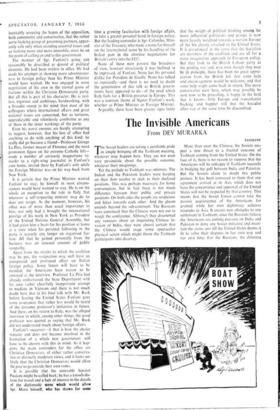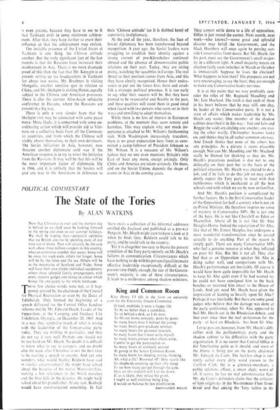The Invisible Americans
From DEV MURARKA
TASHKENT
THE Soviet leaders are taking a justifiable pride in simply bringing off the Tashkent meeting, whatever may happen here. They are not even very pessimistic about the possible outcome, whatever their misgivings.
Yet the prelude to Tashkent was ominous. The Indian and the Pakistani leaders were harping on their firm resolve to stick to their declared positions. This was perhaps necessary for home consumption, but in fact there is not much difference between their public and private positions. On both sides the people are suspicious and bitter towards each other. And the gloom extends beyond the sub-continent. The Russians were convinced that the Chinese were not out to wreck the conference. Although they discounted any rumours about an impending Chinese in- vasion of India, they were almost certain that the Chinese would stage some spectacular physical action which might throw the Tashkent participants into disarray. More than even the Chinese, the Soviets sus- pect a new threat to a fruitful outcome of Tashkent coming from the United States. On the face of it, there is no reason to suppose that the Americans will be unhappy if Tashkent succeeds in bridging the gulf between India and Pakistan. But the Soviets claim to doubt this public posture. It has been conveyed to them that any agreement arrived at in Asia which does not have the concurrence and approval of the United States will not be respected by that country. This means that the Soviet Union cannot take the passive acquiescence of the Americans for granted while her own diplomacy achieves triumphs in Asia. It creates new obstacles to any settlement in Tashkent, since the Russians believe the Americans are putting pressure on India and Pakistan to deny any Soviet initiative and main- tain the status quo till the United States deems it fit to solve their disputes in her own way and her own time. For the Russians, the dilemma
is even greater, because they have to see to it that Tashkent ends in some minimum achieve- ment. After that, they have further to exert their influence so that the achievement may endure.
The invisible presence of the United States at Tashkent is one thing, the Chinese attitude another. But the truly significant fact of the last months is that the Russians have increased their involvement in Asia. There is no more dramatic proof of this than the fact that Mr. Kosygin is at present setting up his headquarters in Tashkent for about two weeks, Mr. Brezhnev is visiting Mongolia, another sensitive spot in relation to China, and Mr. Shelepin is visiting Hanoi, equally subject to the Chinese and American pressures. There is also the current Afro-Asian solidarity conference in Havana, where the Russians are present in a big way.
There is only a very slender hope that the Shelepin visit may be connected with some peace move. More likely, it is concerned with some co- ordinating action which will provide aid to Viet- nam on a collective basis from all the Commun- ist countries, and from which the Chinese will visibly absent themselves, to their own detriment. The Soviet initiatives in Asia, however, now threaten another diplomatic cold war if the American response is to try to wrest the initiative from the Russians. It may well be that this will be the most important factor of diplomatic life in 1966, and it is unlikely that the Soviets will give any way to the Americans in deference to their 'Chinese attitude' (as it is dubbed here) of superiority in diplomacy.
At the end of the year, therefore, the face of Soviet diplomacy has been transformed beyond recognition. A year ago, the Soviet leaders were struggling to establish their identity against a strong current of pro-Khrushchev sentiment abroad and the absence of demonstrative public relations on their part. Today, they are sitting pretty, watching the squabbles in Europe. The real threat to their position comes from Asia, and this they have clearly recognised. Hence their endea- vours to put out the forest fires there and estab- lish a strategic political presence. It is too early to say what their success will be. But they have proved to be resourceful and flexible in the past, and these qualities will stand them in good stead when faced with two powers who seem set in their ways and unwilling to adapt themselves.
While there is no loss of interest in European problems, at the moment they seem remote and harmless. This may explain why not much im- portance is attached to Mr. Wilson's forthcoming visit. With Washington increasingly truculent, there is no great expectation here from as com- mitted a camp-follower of President Johnson as Mr. Wilson. It is a measure of Mr. Wilson's failure that no one even mentions Britain's role East of Suez any more, except jokingly. Only China and America are taken seriously. On them, and on the Soviet Union, depends the shape of events in Asia in the coming years.































 Previous page
Previous page